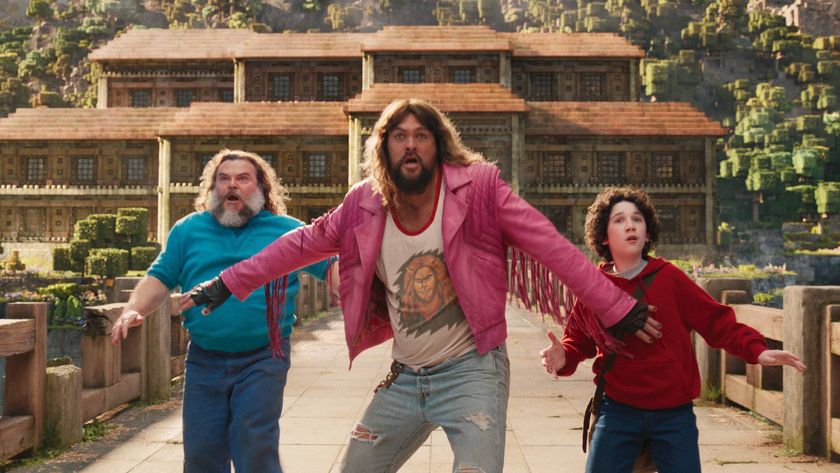Star Wars: Republic Commando retrospective: How a prequel spin-off redeemed itself by rejecting all things Jedi
Republic Commando landing on PS4 and Switch presents the perfect opportunity to discover a forgotten Star Wars gem
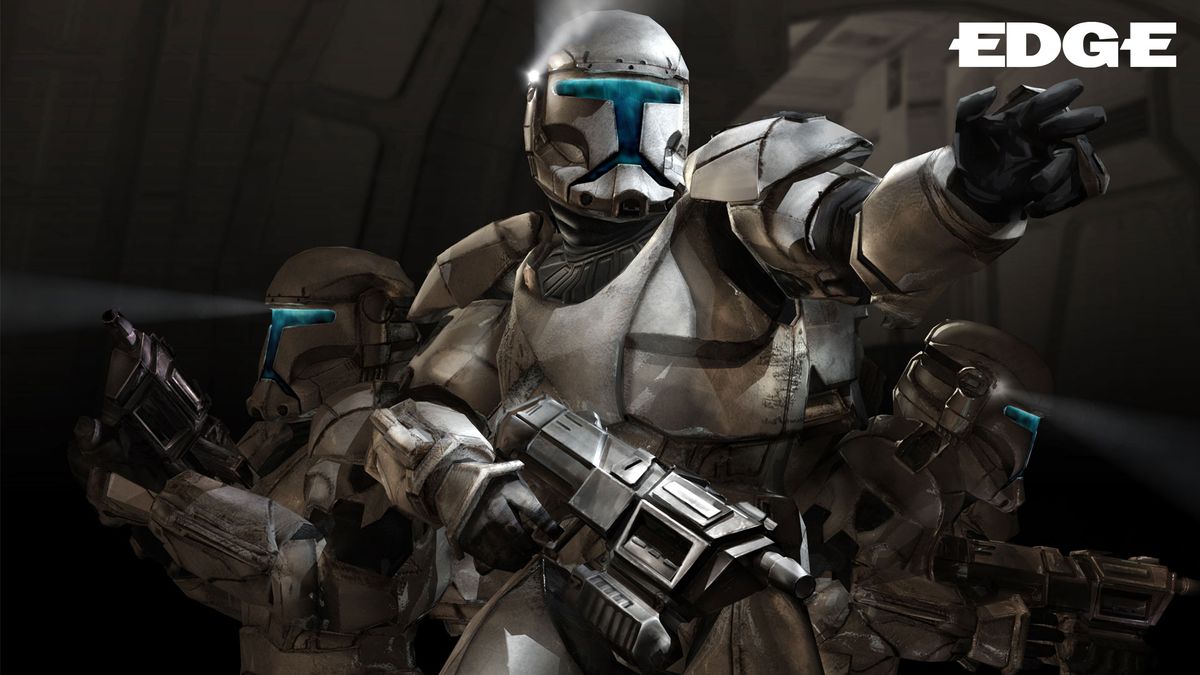
On day 367 of the Clone Wars, in a ghost ship drifting through the Chaykin Cluster, a genetically engineered soldier trips over the shaft of a lightsaber. "An elegant weapon for a more civilized time, eh," he sneers. "Well guess what? Times have changed."
There's a punk nihilism to the clone soldiers, built to back up the Jedi but with no attachment to their history or values. And there's an almost willful disconnection from the romance and spiritualism of mainline Star Wars in Star Wars: Republic Commando, which takes place far from any ideological struggles between good and evil. Its world exists entirely within the confines of a clone's helmet, and concerns the missions of a single squad. It's military, and not moral strength, that wins the day.
Star Wars: Republic Commando was a strange idea in 2005, though perhaps less so than it seems today. Back then, Rainbow Six had been a surprise smash on the nascent Xbox Live, and tactical shooters were briefly considered a commercial proposition. Gearbox released Brothers In Arms to critical acclaim, and then a sequel seven months later. The following year, Ghost Recon Advanced Warfighter would find a balance between unforgiving squad tactics and all-out action, earning an Edge 8 and becoming the fastest selling 360 game of its time.
LucasArts could already do planet-hopping opera and jittery, goofy aliens in the mode of Halo – the Star Wars default setting, perhaps. Thanks to the invention of the commandos for George Lucas' prequel trilogy, they were also able to fold in the satisfying SWAT protocol that had seized the zeitgeist. It must have made for a stellar pitch presentation. For all its shrewd synthesis of popular trends, however, Republic Commando also helped begin another: the diegetic action game, later exemplified by Dead Space and Mirror's Edge.
A new perspective
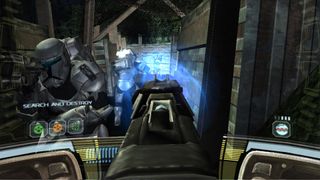
Where Lucas is fond of wipe transitions, which sweep scenes aside the moment they have served their purpose, Republic Commando is utterly dedicated to its single perspective on the universe. There are no cutscenes; mission briefings are delivered via hologram as the squad huddles around the translucent blue form of its clone advisor. The only wipe comes in the form of the cleaning laser that slides across your screen when splattered by insect gunk.
Michel Ancel's King Kong, which released the same year, achieved diegesis by stripping the interface of its ammo and health counts, packing information into audio design instead. But Republic Commando takes the opposite approach, embracing the in-world HUD of the clone soldiers. Much of the screen's real estate is sacrificed in the process: black letterboxing obstructs every corner of your view, mimicking the T-bone visor you see on the soldiers around you. The remaining space is clogged by indicators for your shields, vital signs, mission goals and the status of your squadmates.
It's a claustrophobic and cold way to see the world, designed by commanders who distinguish their subordinates only by number: 38, 62, 40, 07. What's fascinating is the way the squad has already exceeded the clinical bounds set for it. These are men bred to be docile, grown at double speed like GM crops. Their life experience consists of a decade of battle simulation in a blank facility. The invasion of Geonosis, where the game begins, is their first-ever outing.
Sign up to the 12DOVE Newsletter
Weekly digests, tales from the communities you love, and more
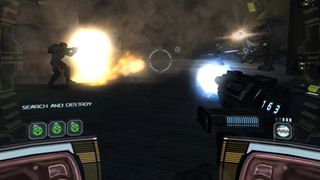

This feature first appeared in Edge magazine. For more like it, subscribe to Edge and get the magazine delivered straight to your door or to a digital device.
Yet they show signs of independence. Rather than stick to their designated digits, they've named each other, like boys in a boarding school. You're cast as Delta-38, or Boss. At some point, 07 has become Sev, and your squad is filled out by Fixer and Scorch. This divergence is only furthered by voice acting. Boss is played by Temuera Morrison, the man who provides the clones' genetic template in the films as Jango Fett. But the rest of the squad are handled by different actors: Sev has a bloodthirsty baritone, Fixer a sensible drawl, and Scorch the throaty charisma of Raphael Sbarge, familiar to fans of Carth and Kaidan in BioWare and Obsidian's space adventures. These personality types aren't atypical for the genre – SWAT 4 has a smart-mouthed squaddie, as does Rainbow Six: Vegas. And there are obvious practical benefits in differentiating NPCs for the player.
Yet the lengths Republic Commando goes to to tell us that not all clones are the same are impossible to ignore. When boarding a compromised clone ship, Delta Squad tut and roll their eyes at the lax procedure that's led to rodents in the engine bays. Later, during a solo mission, Boss laments the fact that the clone soldiers he finds aren't fitted with the commando chip that allows them to recuperate at Bacta stations. They might be genetically identical, but they're not his squad. The very existence of an elite unit suggests that not every Fett is created equal.
The great irony is that it's smoke and mirrors. Though Sev is introduced as a marksman, Fixer a specialised hacker, and Scorch an explosives enthusiastic who once burned off his squadmates' eyebrows, the fact is that they perform all these roles with equal ability. Republic Commando allows for contextual orders to set up sniper points, rain down bombs or splice computer systems, yet the squaddie who answers each call is simply determined by whoever's free. Perhaps Delta Squad's fundamental differences are all in their heads – but wouldn't that make them all the more human if it were true?
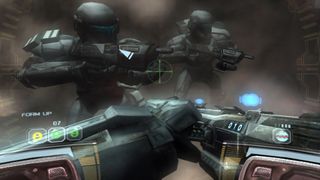
"It's a claustrophobic and cold way to see the world, designed by commanders who distinguish their subordinates only by number"
Republic Commando might seem like an odd venue for the nature-nurture debate, but it's there in the source material. Beyond payment for his genetic code and expertise, Jango Fett's only request is for a clone of his own – a child he can bring up at the usual rate of growth, like a son. That child witnesses his dad's beheading at the hands of the Jedi, and the trauma sets him on the path to becoming a bounty hunter named Boba, distinct from all his brothers in the Republic army.
Given that, it's no surprise Republic Commando is prepossessed with the creation of life. You fight droids literally as they come off the assembly line on Geonosis, watching as their torsos drift by on conveyors, ready to be granted sentience. Most of the fighters on the ground were born into this war without consent, and that makes them sympathetic, even as they blow each other apart.
Ultimately, the knowledge you're a clone influences your behaviour. Since any squad member can revive any other with a defibrillator jolt, everyone's disposable – including you. Sometimes it makes sense to hang back and send a commando on a risky manoeuvre, ensuring you can bring them back if it doesn't work out. At others, you might be that sacrifice, running ahead to pull off a specific task that can't be conveyed using squad commands, accepting that you'll likely be downed in the process. When you order your squaddies to pull you up before a firefight has finished, they'll remind you with no small frustration that to do so is against protocol – your life is no more important than theirs.
Exploring a story worth telling
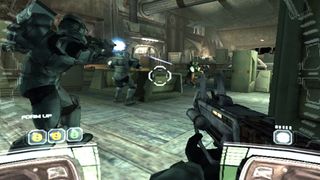
All tactical shooters constitute a kind of efficiency porn. It's the same pleasure that leads us to applaud a pilot upon a perfect landing, of seeing a professional operate at the peak of their ability. Republic Commando, in particular, concerns the triumph of good training over the forces of chaos, in contrast to the messy and emotional business of the Jedi, who so often fail to control their impulses. "While the Jedi above ground take the glory, a small squad of soldiers leaves Geonosis, knowing that they accomplished their mission, with courage, precision and excellence," one debrief reads. "And that is all they need."
If Republic Commando feels like a side story, that's because it is: its first third runs parallel to the events of Attack Of The Clones, a Star Wars film fans have done their best to forget. Despite its post-Jedi attitude, it allows itself a few obvious nods. "These must be the droids we're looking for," quips Scorch during an early skirmish. Listen carefully, and you'll hear a Wilhelm scream within minutes. Its closest tie to the prequel films, however, is its politics.
The imbalanced war in A New Hope was inspired by Vietnam, and Lucas only got more explicit over the years. In an age when a subset of Star Wars fans deride the new films for getting political, it's important to remember that much of the prequel trilogy's action took place in a senate chamber. Republic Commando shows no such tendencies until its final third, when it suddenly becomes a story about liberation from detention centres. The squad sets down on Kashyyyk to find the Wookiees caged and enslaved. Once they're released, they become like Half-Life's doctors and guards – vulnerable NPCs you can't help but try to look after.
It's odd to look back at Republic Commando at a time when Disney has been criticised for closing off much of the Star Wars universe. The property's new owner has de-canonised much of its past while attempting to wrap up decades of loose ends with a bow in The Rise Of Skywalker. Republic Commando, by contrast, sits in the midst of exponential spin-offs. It is born from a film which, in itself, was derived from a couple of throwaway references to clones in A New Hope. And it birthed more stories still: a series of Republic Commando novels, plus a handful of comics and a mobile game. Republic Commando is a game from a universe which, like our own, was still expanding. That's intrinsically a more hopeful and exciting place to be than one that appears to be shrinking to a single point.
This Star Wars: Republic Commando retrospective first appeared in issue 334 of Edge. An enhanced port of the 2005 release is now available for PS4 and Nintendo Switch.
Jeremy is a freelance editor and writer with a decade’s experience across publications like GamesRadar, Rock Paper Shotgun, PC Gamer and Edge. He specialises in features and interviews, and gets a special kick out of meeting the word count exactly. He missed the golden age of magazines, so is making up for lost time while maintaining a healthy modern guilt over the paper waste. Jeremy was once told off by the director of Dishonored 2 for not having played Dishonored 2, an error he has since corrected.

Metaphor: ReFantazio wanted to fix the JRPG grinding problem, but Atlus went too far at one point and accidentally broke the whole combat system
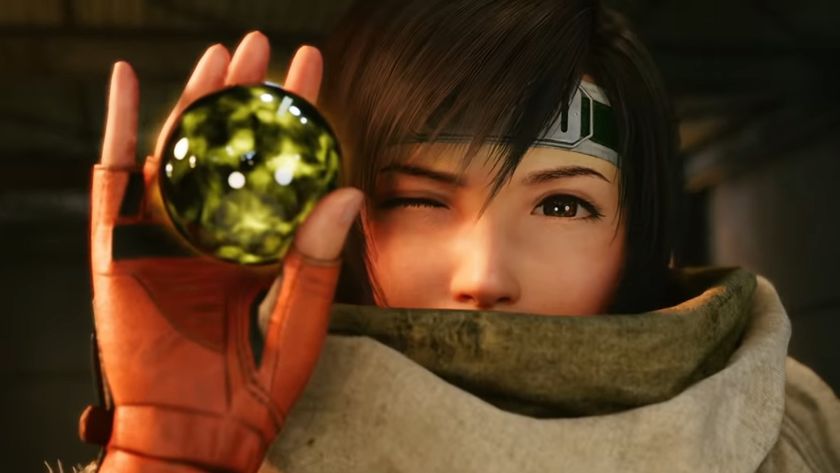
Final Fantasy 7 Remake and Rebirth battle director says combining everything he learned on Monster Hunter: World with Square Enix's technology and unique skills created a "chemical reaction"

